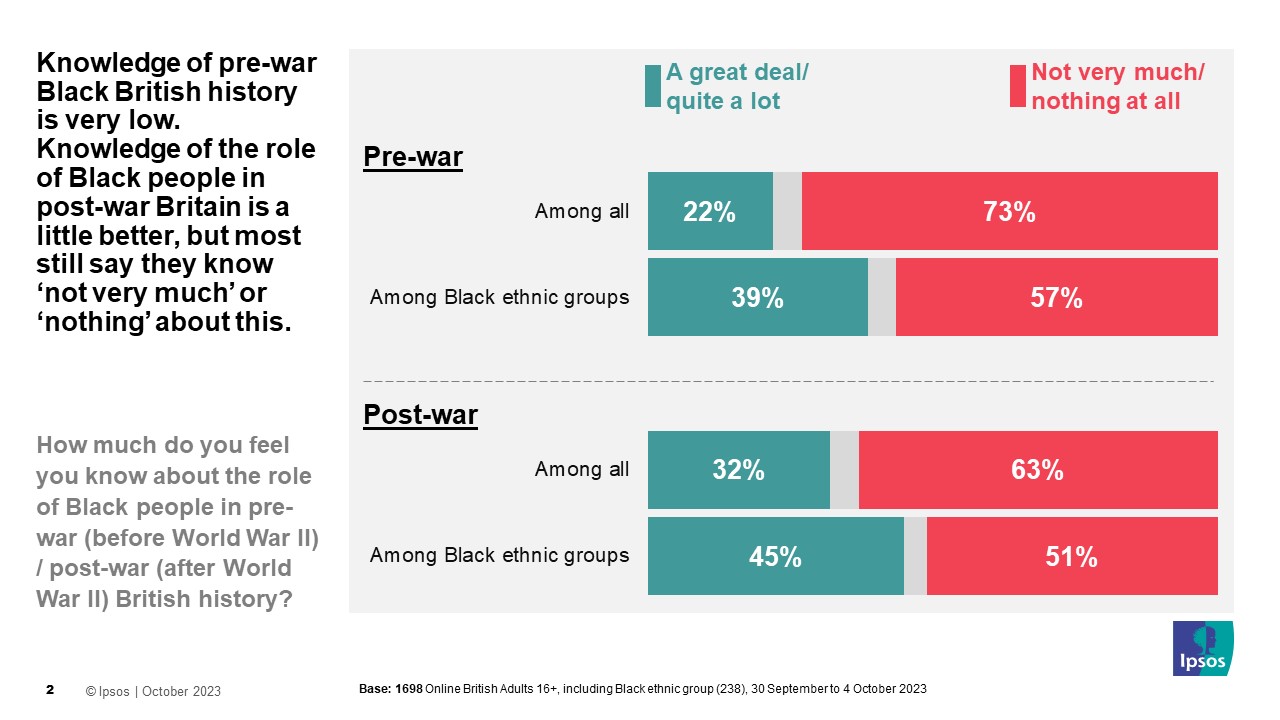New Ipsos research for Black History Month shows appetite for education on Black British History
A song released by the BBC’s children’s TV show, Horrible Histories, in which it highlights “the contribution of Black people to British life throughout history”, was recently accused of “rewriting history”. However, a new Ipsos poll, conducted during Black History Month, shows strong public support for education on Black British History.
The theme for this year’s Black History Month is ‘Before Windrush’, which seeks to recognise and explore the lives and stories of Black Britons who were living in Britain before the arrival of the HMT Empire Windrush in 1948.
Our poll finds that the majority of Brits know relatively little about the role of Black people in British history, with most saying they know ‘not very much’ or ‘nothing at all’ about the role of Black people in either pre-war (73%) or post-war (63%) British history.

Perhaps unsurprisingly (given most people’s school days are behind them) most people don’t have a strong view on whether schools do a good or bad job of teaching about Black British history. However, among those who did express a view, more felt they did a bad job (29%) than said they did a good job (19%). And among Brits from ethnic minority background, two in five (41%) think schools do a bad job educating people about Black British history, rising to 48% among Black people.

But there is public support for education on Black British history – at least 6 in 10 Brits support education on Black British history in both primary (60%) and secondary (65%) schools. And a similar proportion of Brits (63%) also support Black British history being highlight by organisations like the National Trust, in spite of the criticisms levelled at their recent efforts on this front by some politicians.

In fact, the poll shows that more people support than oppose more education on Black British History across the political spectrum. For example, although 2019 Labour voters were more likely than 2019 Conservative voters to support organisations like the National Trust highlighting the role Black people have played in British history, half (51%) of Conservative voters supported this too, and only 13% opposed it.
These findings suggest that, in contrast with the views of critics of Horrible Histories, the British public as a whole is broadly supportive of efforts to raise our level of understanding of the diversity of Britain's long history and the role Black people play in it.
Technical Note
Ipsos interviewed an overall online sample of 1,698 adults aged 16-76+ years across Great Britain between 30 September to 4 October 2023. The sample comprises a nationally representative sample of 1,000 people and a further boost of 200 ethnic minority adults, 200 Black adults and 200 adults aged 76+. In total, 520 ethnic minority people were interviewed as part of this survey, including 238 Black/Mixed Black British people. Data are weighted to the profile of the population and the ethnic minority sample is weighted to the overall profile of the ethnic minority population. All polls are subject to a wide range of potential sources of error.



